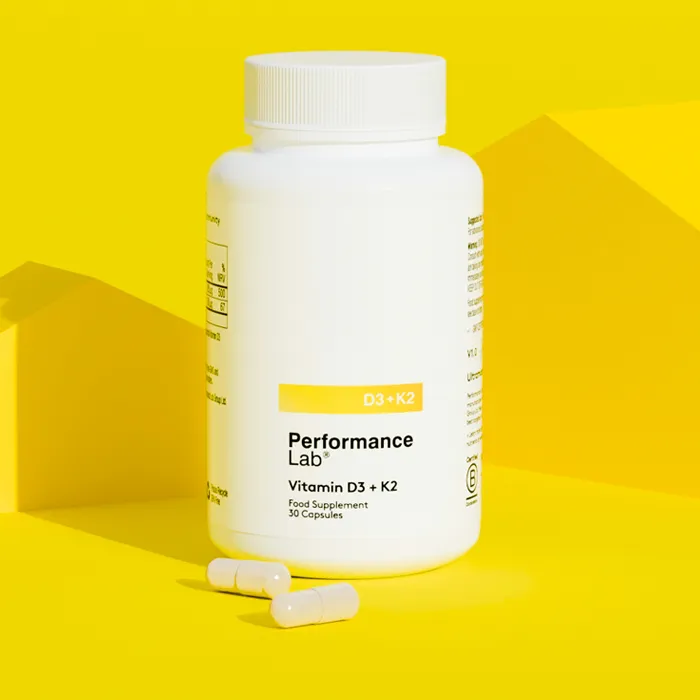Vitamin D is one of the most important nutrients in the human body. Virtually every cell contains a vitamin D receptor, and specific cells can even synthesize the active form.
And although it’s known for its main role in bone metabolism and calcium absorption, research shows that the action of vitamin D extends beyond that of just protecting your bones—it’s a critical component of the immune system, mental health, cellular growth, and yes, it can even affect bowel movements.
Vitamin D supplements support health but taking them the wrong way can cause side effects, including gastrointestinal symptoms. So if you’re wondering, “Does Vitamin D cause constipation?” you’re in the right place. In this article, we’re delving into the potential digestive side effects of Vitamin D and how you can avoid them.
Let’s get to it!
Key Takeaways
- Vitamin D is crucial for bone health, immune function, mood, and muscle and nerve activity, and many people do not get enough from sunlight and diet alone.
- Typical supplemental doses of vitamin D do not usually cause constipation, and deficiency is far more common than toxicity.
- Problems tend to arise with long term mega dosing that raises blood calcium levels too high, which can trigger digestive issues such as constipation, nausea, and abdominal pain.
- Staying within recommended intakes, pairing vitamin D3 with vitamin K2 and other cofactors, and working with a healthcare professional if you have bowel motility issues helps you enjoy the benefits of vitamin D while keeping digestion comfortable.

The Importance Of Vitamin D
Vitamin D is a fat soluble vitamin in the body that plays roles in everything from immune function and mental health to weight loss and helping with low bone mineral density.
Vitamin D exhibits a wide range of functions. The active form (D3) binds to vitamin D receptors and can turn on or off genes to alter cell behaviors.(1,2)
Research has shown that maintaining adequate vitamin D levels can help to support:(3-5)
-
Immune health
-
Mood and mental health
-
Weight management
-
Muscle strength
-
Blood sugar regulation
Optimal Vitamin D levels build a foundation for robust overall health, but many people fall short on this key nutrient. That’s why vitamin D supplements are so popular. Vitamin D deficiency has been linked to intestinal motility disorders, which can affect bowel movements.
However, excessive vitamin D intake isn’t necessarily a good thing. There are a handful of adverse outcomes that can result from excess vitamin D, including:
-
Hypervitaminosis D: Although vitamin D toxicity is rare, it’s usually caused by megadosing. It’s defined as blood concentrations exceeding 100 ng/mL, while vitamin D intoxication is blood concentrations exceeding 150 ng/mL.(6,7) But you probably don’t need to worry about it if you keep your daily intake below 10,000 IU.
-
Hypercalcemia: Vitamin D is important for helping your body absorb calcium, but high dose vitamin D can lead to elevated calcium levels, also called hypercalcemia. High blood calcium levels usually result from mega-dosing vitamin D in conjunction with high calcium intake (including calcium supplements) for a long period of time. Too much calcium may cause nausea, vomiting, muscle weakness, and kidney problems.(8,9)
-
GI symptoms: Most GI symptoms associated with vitamin D result from high serum calcium concentrations. Some of the most common symptoms include nausea, vomiting, constipation, poor appetite, stomach pain, and diarrhea.
-
Altered mental state: Because of vitamin D’s role in the brain, excessive vitamin D levels that cause hypercalcemia can result in symptoms like depression, confusion, psychosis, and in severe cases, even coma.(10)
-
Kidney problems: Too much vitamin D can lead to abnormally high calcium levels, which result in water loss via excessive urination and calcification of the kidneys.(11) But it can also cause constriction of blood vessels in the kidneys, which impairs kidney function.
Constipation And Vitamin D: What's The Connection?
If you’re dealing with constipation, chances are you aren’t thinking about what nutrients you’re deficient in. Most people assume insufficient fiber or stress is the culprit, but vitamin D levels could be involved, as well. Vitamin D plays a crucial role in calcium homeostasis, which can impact digestive health and potentially lead to constipation.
Too much or too little of the sunshine vitamin could result in a digestive backup.
Here’s why.
Too Much Vitamin D: Calcium Homeostasis and Excessive Vitamin D Intake
The primary reason the excessive intake of vitamin D can cause GI issues is its role in calcium homeostasis.
Hypervitaminosis D increases calcium uptake from the gut and increases serum calcium levels.
When serum calcium levels exceed the level needed for normal cellular function, it leads to hyperpolarization of cell membranes, which manifests in several body systems—the symptoms have led to the creation of the mnemonic “stones, bones, abdominal moans, and psychic groans”.(12)
The “abdominal moans” are any digestive disorders or related gut symptoms, most commonly presenting as nausea, vomiting, abdominal pain, weight loss, and constipation. This condition, known as hypercalcemia, is a direct result of elevated serum calcium levels due to excessive vitamin D intake.
Too Little Vitamin D: Slow Transit Constipation and Vitamin D Deficiency
Slow transit constipation is a type of chronic functional constipation where there is a prolonged delay in the movement of food waste through the digestive tract.
The connection between vitamin D and constipation may be promising, but it isn’t extensively studied yet. Some of the theories so far:
Muscle Function: Vitamin D is known to help regulate muscle contraction, which is crucial for the peristaltic movements of the colon responsible for moving stool through the digestive system. A deficiency in vitamin D may weaken these muscle contractions, potentially contributing to constipation.
Nerve Function: Vitamin D also plays a role in nerve health and function. It helps in the maintenance of calcium levels in the blood, which is vital for nerve transmission. Impaired nerve function in the gut can lead to reduced perist
Can vitamin D solve constipation concerns then?
It’s not quite as simple as that. The best answer might be “to be determined.”
While the direct link between vitamin D constipation effects needs more research, it seems that ensuring adequate levels of vitamin D might help overall gut health and regularity. Additionally, vitamin D supplementation may help with intestinal motility disorders, which are linked to chronic functional constipation.
That’s where supplements come in. To bring low vitamin D levels back up to par.
If they are clean, premium, easy to digest and appropriately dosed, supplements can improve vitamin D status without causing constipation.
We’ve got three high-quality Vitamin D supplements that fit the bill coming up.
But first, let’s talk about vitamin D foods.
Vitamin D3 vs. Vitamin D2: What's the difference?
Through a series of bioactivities collectively known as "vitamin D metabolism," the human body converts vitamin D from its inactive D2 (ergocalciferol) form (obtained from sunlight exposure, food, or supplements) into its active form, D3 (cholecalciferol).
Vitamin D3 (cholecalciferol) is the preferred form of Vitamin D.
Vitamin D3 is generally considered more effective than D2. It is more potent and efficiently raises and maintains vitamin D levels in the blood. Vitamin D3 is also the natural form; identical to what the body produces when skin is exposed to sunlight. High-quality supplements use Vitamin D3.
How to Improve Vitamin D Status with Foods, Sunshine and Supplements

Here's a list of foods rich in vitamin D, along with the amount of vitamin D provided in a typical serving:
-
Salmon (Wild-Caught): About 988 IU per 3.5 oz serving.
-
Mackerel: Approximately 643 IU per 3.5 oz serving.
-
Sardines (Canned): Roughly 272 IU per 3.5 oz serving.
-
Cod Liver Oil: Around 1,360 IU per tablespoon.
-
Tuna (Canned): About 236 IU per 3.5 oz serving.
-
Egg Yolks: Roughly 44 IU per large egg.
-
Mushrooms (Fortified): Varies, up to 400 IU per 3.5 oz serving, depending on UV light exposure.
-
Fortified Milk: About 120 to 130 IU per 8 oz serving.
-
Fortified Orange Juice: Approximately 100 IU per 8 oz serving.
-
Fortified Cereal: Varies, approximately 40 to 100 IU per serving.
Always check nutritional labels for the most accurate information.
Foods that supply prebiotic fiber and probiotics (beneficial bacteria) are also good for vitamin D status and digestive health overall. Learn more on prebiotics and probiotics for constipation
Sunshine

It's called the sunshine vitamin for a reason. Everyone can safely boost their Vitamin D levels through sensible sunlight exposure. On a sunny day, the body can produce up to 10,000 IU of Vitamin D from sunlight exposure.
Sensible sunlight exposure means spending about 10 to 30 minutes in the midday sun several times a week. Those with lighter skin tones may require less time, while those with darker skin might need more.
After that initial sun exposure, it’s crucial to apply SPF 30+ sunscreen and cover up with clothing and perhaps a wide-brimmed hat to protect against harmful UV rays and minimize skin damage.
Always consult with a healthcare provider before extensive sunlight exposure, especially if you have skin health concerns.
If you'd rather avoid the sun, consider taking Vitamin D supplements instead.
Vitamin D Supplements

Vitamin D supplements are a major segment in the health and wellness industry
-
High demand due to crucial need of supplements to combat widespread vitamin D deficiency
-
Featured in various formulas, including multivitamins and immune health supplements
-
Available in multiple forms such as capsules, softgels, liquid drops, and chewable tablets.
-
Recent popularity attributed to growing interest in vitamin D’s role in enhancing immune function
-
While high dose vitamin D supplements can be beneficial, they also carry risks if not taken appropriately
For a long time, Vitamin D has been paired with calcium for bone health or magnesium to aid metabolism. Advanced formulas now pairing Vitamin D with Vitamin K2 for cardiovascular support.
Let’s now take a look at the best Vitamin D supplements on the market today.
Best Vitamin D Supplements for Constipation Concerns
Concerned about the possible link between vitamin D and constipation? Choosing the right vitamin D supplement can help manage intestinal motility disorders and reduce constipation. The following supplements can help you harness all vitamin D benefits without any drawbacks… or backups.
These formulas are designed to be gentle on the stomach. They even come in prebiotic-infused capsules, which further help gut health.
Related Post: Top 7 Vitamins for Gut Health (And Where to Find Them)
And they provide appropriate dosages – enough vitamin D to support health, but not too much where it triggers constipation.
Performance Lab D3 + K2

Performance Lab D3+K2 is designed to optimize vitamin D levels while unlocking the nutritional synergy of vitamin D3 and vitamin K2.
These two fat soluble vitamins work together to enhance calcium absorption and direct calcium to the bones, rather than soft tissues – thereby helping bone health and cardiovascular health at the same time.
Performance Lab D3+K2 is particularly useful for individuals with lower vitamin D levels seeking to improve their status without the digestive discomfort sometimes associated with high-dose vitamin D supplements. Performance Lab D3+K2 can help manage intestinal motility disorders, which are linked to chronic functional constipation.
Its clean, allergen-free formula makes it a top contender for the best vitamin D supplement for digestive comfort.
This supplement contains a gentle form of vitamin D3, combined with prebiotics for improved digestion and absorption, making it an excellent choice for those with sensitive stomachs or who prefer taking vitamin supplements that are easy on the digestive system.
The Performance Lab D3+K2 supplement provides 62.5 mcg (2500 IU) of Vitamin D3 per serving. This dosage effectively supports bone health, immune function, and calcium metabolism when taken as part of a daily supplement regimen.
Ingredients: Vitamin D3 (from algae), Vitamin K2 (from NutriGenesis®)
Performance Lab® NutriGenesis D3+K2 combines plant-based vitamin D3 (from algae) with vitamin K2 (as NutriGenesis®) for an extra shot of two key essentials for bone, heart, and immune support.
Performance Lab NutriGenesis Multi

NutriGenesis® nature-identical vitamin and mineral essentials for healthy biological performance.
Ingredients: 24 cultured essential vitamins and minerals complexed with cofactors for optimal potency.
NutriGenesis® is ultramodern nutrition technology unique to Performance Lab® – supplying vitamins and minerals bioengineered (grown in a lab setting) with cofactors that boost absorption and maximize their benefits. More on NutriGenesis
With NutriGenesis Multi, there’s no megadosing—you’re getting exactly what you need, no more and no less, to support healthy cell performance across all body systems. NutriGenesis Multi can help manage intestinal motility disorders, which are linked to chronic functional constipation.
All of this delivered in NutriCaps®—prebiotic-infused and vegan-friendly capsules for digestive comfort and peace of mind—and a clean-label, eco-friendly format.
-
NutriGenesis Multi for men provides 50 mcg (2000 IU) of Vitamin D3 per serving
-
NutriGenesis Multi for women offers 62.5 mcg (2500 IU) of Vitamin D3 per serving.
These amounts are designed to support overall health, including bone, immune, and muscle function.
Shop Performance Lab® NutriGenesis®
Performance Lab Immune

Today’s most dynamic immune performance supplement: Broad-range support for complex immune challenges.
Ingredients: Vitamin D3 (liposomal from lichen), Vitamin C (via NutriGenesis®), Selenium (via NutriGenesis®), Zinc (via NutriGenesis®), Lactococcus lactis strain Plasma (Postbiotic), Glutathione.
Your immune system is involved in everything you do daily, including bowel health and regularity. But for it to perform, it needs nourishment. Performance Lab® Immune is one supplement designed to address all immune concerns.
It restores weakened defenses first, then activates five types of immune cells to help them coordinate, multiply, and perform. Performance Lab Immune can help manage intestinal motility disorders, which are linked to chronic functional constipation. From day to day and season to season, Immune supplies broad-range support to keep your immune system healthy.
Performance Lab® Immune supplies 25 mcg of natural Vitamin D3 per serving.
Performance Lab Prebiotic

Prebiotic fiber feeds gut probiotics (good bacteria) that help with digestive comfort and regularity.
Ingredients: Each serving of 3 NutriCaps supplies two grams of Inulin-FOS (FructoOligoSaccharides) from chicory root.
Filling up on fiber can help you to avoid constipation. Performance Lab® Prebiotic is a performance fiber supplement in convenient capsules. Performance Lab Prebiotic can help manage intestinal motility disorders, which are linked to chronic functional constipation.
What sets Performance Lab Prebiotic apart is its purity and the specific choice of inulin and FOS, which selectively feed only the healthiest probiotic bacteria like Bifidobacterium.
This “targeted feeding” helps maintain a balanced gut microbiota, leading to better digestion, less bloating, and a reduction in constipation.
Shop Performance Lab® Prebiotic
Conclusion
Vitamin D is a key nutrient for supporting overall health and quality of life.
But does vitamin D cause constipation? Some concerns have emerged about the potential gastrointestinal side effects, particularly constipation, associated with unbalanced vitamin D levels.
This article has explored these concerns, highlighting that while excessive intake of vitamin D can lead to digestive issues, including those related to calcium absorption, these can be managed by sticking to recommended dosages and selecting high-quality, well-dosed supplements.
For those looking to supplement their diet with vitamin D without risking constipation, choosing clean, well-formulated vitamin D supplements – like the ones we discussed above – is key. These products are specifically designed to be absorbed efficiently and gently, minimizing any potential for gastrointestinal discomfort.
Ultimately, it’s essential that you talk with your doctor first to determine the appropriate vitamin D supplementation strategy for your specific health needs.
By doing so, you may enjoy the many benefits of vitamin D, from stronger bones and a more robust immune response to improved overall well-being, all while keeping digestive comfort in mind.
References
-
Hossein-nezhad A, Spira A, Holick MF. Influence of vitamin D status and vitamin D3 supplementation on genome wide expression of white blood cells: a randomized double-blind clinical trial. PLoS One. 2013;8(3):e58725.
-
Darwish H, DeLuca HF. Vitamin D-regulated gene expression. Crit Rev Eukaryot Gene Expr. 1993;3(2):89-116.
-
Tomlinson PB, Joseph C, Angioi M. Effects of vitamin D supplementation on upper and lower body muscle strength levels in healthy individuals. A systematic review with meta-analysis. J Sci Med Sport. 2015;18(5):575-580.
-
Hyppönen E, Läärä E, Reunanen A, Järvelin MR, Virtanen SM. Intake of vitamin D and risk of type 1 diabetes: a birth-cohort study. Lancet. 2001;358(9292):1500-1503.
-
Lappe, JM. The role of vitamin D in human health: a paradigm shift. J Evid Based Complementary Altern Med. 2011;16(1):58-72.
-
Rahesh J, Chu V, Peiris AN. Hypervitaminosis D without toxicity. Proc (Bayl Univ Med Cent). 2019;33(1):42-43.
-
Taylor PN, Davies JS. A review of the growing risk of vitamin D toxicity from inappropriate practice. Br J Clin Pharmacol. 2018;84(6):1121-1127.
-
Tebben PJ, Singh RJ, Kumar R. Vitamin D-Mediated Hypercalcemia: Mechanisms, Diagnosis, and Treatment. Endocr Rev. 2016;37(5):521-547.
-
De Vincentis S, Russo A, Milazzo M, et al. How Much Vitamin D is Too Much? A Case Report and Review of the Literature. Endocr Metab Immune Disord Drug Targets. 2021;21(9):1653-1659.
-
Marcinowska-Suchowierska E, Kupisz-Urbańska M, Łukaszkiewicz J, Płudowski P, Jones G. Vitamin D Toxicity-A Clinical Perspective. Front Endocrinol (Lausanne). 2018;9:550.
-
Graidis S, Papavramidis TS, Papaioannou M. Vitamin D and Acute Kidney Injury: A Two-Way Causality Relation and a Predictive, Prognostic, and Therapeutic Role of Vitamin D. Front Nutr. 2021;7:630951.
-
Carroll MF, Schade DS. A practical approach to hypercalcemia. Am Fam Physician. 2003;67(9):1959-1966.
-
Panarese A, Pesce F, Porcelli P, et al. Chronic functional constipation is strongly linked to vitamin D deficiency. World J Gastroenterol. 2019;25(14):1729-1740.















